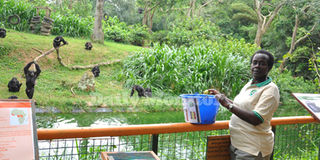Prime
Atim’s heart beats for chimpanzees

Atim feeding chimpanzees. She says when she started doing this job, many of her friends did not understand what she was doing. PHOTO/EVE MUGANGA
What you need to know:
- In 1979, her uncle was killed in the war that toppled Gen Idi Amin, setting back her education as she stayed a year out of school.
Fifty-seven-year old Hellen Atim Lolwa has spent 20 years babysitting chimpanzees (chimps) at the Uganda Wildlife Education Conservation Centre (UWEC) in Entebbe.
“At first I didn’t like it and cried. I asked why God would punish me this way,” she recalls.
At the time, Atim felt babysitting an animal was a curse.
But she got the courage to soldier on when her mother told her the chimps could become her source of blessings.
That was in August 2000 when Atim worked as a volunteer.
Soon she accepted the hard reality of spending days and nights babysitting chimps.
“My mother asked whether I was the only person babysitting the chimps. I said no, there was also a white lady. My mum then told me that if someone could fly all the way from Europe to come and babysit chimps, ‘what of you who is based here in Uganda?”
“From then on, I started liking my work, and loving the chimps,” she says.
Atim had worked as secretary to the chief nursing officer at the Ministry of Health before being laid off.
“In 1990, I joined Entebbe Grade B Hospital as a copy typist for six years. I was later transferred to the Ministry of Health headquarters training division as a secretary to the chief nursing officer.”
“That year, decentralisation commenced. Although I was working with the Ministry of Health headquarters, my salary was sent to the district. When the issue of ghost workers came up, they queried how someone could work at the central government but receive salary at the district? I was laid off and sat home for four years.”
That’s when the chimps’ job came beckoning.
“I Joined UWEC through a friend who was concerned about me sitting home for four years after being laid off.
When I asked what kind of job was on offer, she said babysitting chimps.
As a volunteer, I was paid Shs5,000 per day, but whenever I worked day and night, they would double the pay. It was good money.
In 2001, they advertised for an animal keeper and Betty Kamya, who was director then and Debicocks, who was director at Ngamba Chimpanzee Sanctuary, told me to apply. Both were pleased with my work.
I was given the contract in April 2001, with a salary of Shs390,000, which was good pay,” Atim recalls.
Baby chimps
“There were three baby chimps; Yoyo, Matooke and Kisembo, but the centre had five other chimps already integrated, among them; alpha male Zakayo, Amiina, Ruth, Kigogoro and Kitomi.
The baby chimps were kept in bandas because there was no quarantine and they were fed on Nan powdered milk. But as they matured, they were fed on noodles. They had early morning breakfast of yellow bananas and boiled eggs. This was done four times a day. They would also teach them how to use a cup, after breakfast, they would go into the forest and stay with the chimps so that they could learn to play and climb trees.
“But we didn’t bathe them although they would always play in the rain. The veterinary doctors always carried out health checkups,” she says.
The four of them nursed chimps in shifts such as morning, afternoon and night, and experience she says was fun most of the times, though, other days were challenging.
“One day, I was grabbed by Kisembo, he swung round and bit me,” she says, adding that after the incident, she had sworn to leave but her mother talked her into staying.
“The chimps can also be naughty, they can wake up at odd hours and have to be fed and keep a minder awake till morning,” Atim says.
Stubborn ones
She recalls that at times, they would slap and jump on her but as a minder, she was never allowed to tease or harass them.
Majority of the animals at UWEC are originally rescued, in distress and in need, the chimps are not an exception, many have been in captivity in places as far as the Uganda/DRC border.
In 2016 for instance, the team rescued one velvet monkey that had been held at a garage in Mengo. According to their report, the monkey had been at the garage for nearly two years and had been fed on beer, sugarcanes and cigarettes by the mechanics.
Atim says, at the beginning, many of her friends barely understood what she was doing, “Even when I told them I am an animal keeper at UWEC, they thought I was keeping cattle.”
When she however, told them that she was taking care of chimps, they all came to see how she was doing it.
“After some time, I became proud of my work, partly because the pay was good,” Atim says.
Atim notes that her highlight on the job was the opportunity to fly out of the country, twice, “I was excited because there are people who are rich, but have never boarded a plane.”
Even more importantly, I have learnt how to work with animals, tell their behaviour and work with local communities. I have built a house for mother and myself.
But most importantly, she appreciates a fact that she has learnt how to work with animals, “I lived with little chimps when they were only two to three months old until they were integrated with the older ones after at least a year.”
Biography
Hellen Atim Lolwa was born in Gulu District in 1964 to Ms Margret Anyu and Mr Olyel.
She grew up with her mother because her father died when she was young. She says she grew up as a quiet and shy girl. She went to Gulu Primary School in 1970 where she attended Primary One to Primary Four, and completed P7 at Mary Immaculate Primary School.
In 1979, her uncle was killed in the war that toppled Gen Idi Amin, setting back her education as she stayed a year out of school.
In 1980, she resumed school at Sacred Heart Girl’s School in Gulu for S1 and S2. She later joined Tororo Girls School in Tororo District , as a day scholar. She also brewed local beer to meet her school fees. After Senior Four, Atim did her secretarial course. She later joined Entebbe Grade B hospital in 1990.
Meeting Goodall
And of course, for many people in conservation, there is nothing as heartwarming as interacting with Jane Goodall.
She is an English primatologist and anthropologist. Considered to be the world’s foremost expert on chimpanzees, Goodall is best known for her 60-year study of social and family interactions of wild chimpanzees since she first went to Gombe Stream National Park in Tanzania in 1960, where she witnessed human-like behaviours amongst chimpanzees, including armed conflict.
“In 2006, I was invited for the international primatologist conference. Goodall and I were part of the speakers,” she says.
But there are sad moments too, for instance, when old Zakayo died – “I was the one that called the vet. I was on the late shift and when I saw Zakayo’s condition, I knew something was wrong.”
Zakayo, the oldest chimpanzee at UWEC, died in April 2018 at 54 years old. The chimp’s name was synonymous with all the species like him and his legacy had spanned generations, often, parents visited the zoo to show their children Zakayo, the chimp they saw when they were young.
Sources:
www.businessdailyafrica,
www.livescience
Sources: businessdailyafrica.com and livescience.com





